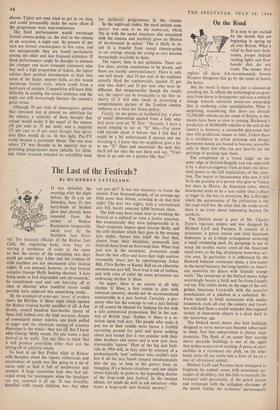The Last of the Festivals?
By HUMPHREY LYTTELTON
IT was definitely the morning after the night before. By 10 a.m. on Saturday, June 27, two lorry-loads of broken glass had already been removed from the corner of Redcar Racecourse temporarily taken over by the Northern Jazz Festi- val. The harassed officials of the Redcar Jazz Club, the organising body, were busy re- storing a semblance of order to the scene so that the events of the remaining two days could get under way. Litter and the residues of mild mayhem are not uncommon after festival nights. It was unusual, however, to find festival compere George Melly looking shocked. hate being made to feel disgruntled and old-mannish,' he complained—and sent one hurrying off at once to discover what youthful excess could possibly have achieved this astonishing result.
By the standard of some epic 'raves' of modern times, the Rhythm 'n' Blues night which opened the Redcar festival hardly qualifies at all. A few brawls, several hundred beer-bottles (many of them full) lobbed over the high marquee, dozens of consequent minor injuries, one knife pulled in anger and the wholesale casting of amatory discretion to the winds—that was all. But I know what George Melly meant. No one wants a jazz festival to be stuffy. Yet one likes to think that it will produce something other than just the letting-off of nihilistic steam.
To look in on that Friday night at Redcar with thoughts about the vigour, enthusiasm and creativeness of youth was like going to a tin of cocoa only to find it full of mealworms and sawdust. A large committee lady who had sal- vaged string for tourniquets when the bandages ran out, summed it all up. `It was dreadful, dreadful—only young children, too—but what can you do?' It was not necessary to frame the answer. Four thousand people, of an average age little more than fifteen, crowded in on that first night. The next two nights, with a conventional jazz bill, barely amassed 4,000 between them.
The kids may have come near to wrecking the festival as a cultural or even a festive occasion. But economically they were indispensable to it. Their traumatic impact upon George Melly, and the cold shoulder which they gave to the ensuing jazz nights, throws into relief the fact that, almost from their inception, mammoth jazz festivals have lived on borrowed time. When trad jazz was in the ascendant, promoters could boost the box office and leave their high motives reasonably intact just by superimposing Acker Bilk, Chris Barber or Kenny Ball on an otherwise adventurous jazz bill. Now trad is out of fashion, and with cries of relief the same promoters are embracing rhythm 'n' blues.
On paper, there is no reason at all why rhythm 'n' blues, a first cousin to jazz, with common ancestry, should not be accommodated comfortably in a jazz festival. Certainly, a pro- moter who has the courage to run a jazz festival at all cannot be blamed for hedging his bet with a safe commercial proposition. But in the con- text of British `pop,' rhythm 'n' blues is a re- action again trad jazz. The people who make it pay are in their middle teens (never a fruitful recruiting ground for jazz) and know nothing about jazz except that it was popular with their elder brothers and sisters and is now ipso facto irrevocably 'square.' Most of the big jazz festi- vals in 1964 will, in fact, exist by courtesy of a predominantly 'pop' audience who couldn't care less if all the jazz bands jumped simultaneously into the sea, so long as the guitars keep on twanging. It's a bizarre situation—and one which seems logically to point to the impending demise of the large-scale jazz festival. In the ensuing silence, we might do well to ask ourselves—who wants a large-scale jazz festival anyway?










































 Previous page
Previous page